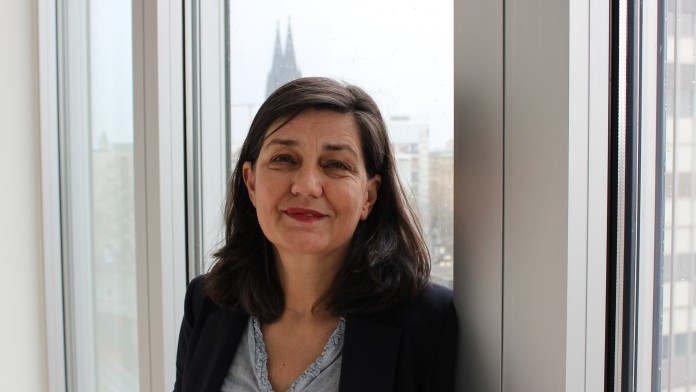News from 2024-04-09 / DEG
Three questions for DEG CSO Christiane Rudolph

DEG’s Chief Sustainability Officer, appointed on 1 October 2023, describes the topics she is currently dealing with and how she wants to help make DEG even more sustainable.
You have been DEG’s Chief Sustainability Officer (CSO) for the past six months. Which areas are currently receiving particular attention?
The focus is on implementing our Impact.Climate.Returns strategy which aims actively to shape the transformation of our partner companies through our financing and advisory services, making them more resilient and fit for the future. These efforts include, among other things, improving environmental and social management systems, specific measures for the advancement of women, and investments in resource efficiency and climate consulting. I am very committed to this.
In my newly created role at DEG, I am able to contribute much of the experience I have gained from the many years I spent as an environmental and social expert at DEG, from my activities as project manager developing this very strategy, and from my responsibility in recent years of working with Asian companies in the Industries & Services division.
Over the past few months, we have been working intensively on further developing the impact measurement system which DEG uses to measure the local impact of the investments we co-finance for our customers – for example, the extent to which local income, skilled jobs or green electricity are created.
While continuing to develop the methodology and the tool (DERa) we use to survey impacts, we are also working to identify the specific contributions that DEG is making to the transformation of companies. Furthermore, DERa2.0 represents the first time that a “net impact” approach is used, in other words, working out which positive impacts and which potentially detrimental effects a project has locally.
One important transformation issue is the reduction of emissions to help mitigate the consequences of climate change. What is DEG’s current position on this?
We have set ourselves the goal of pursuing an investment path in line with the 1.5 degree Celsius target of the Paris Climate Agreement in order to achieve a climate-neutral portfolio by 2040. Our aim is to reduce the greenhouse gas intensity of our investments by two thirds by 2040 compared with 2021. In this process, we are guided by the Science-based Targets Initiative (SBTi).
DEG’s reduction pathway is made up of three components, of which the first two are the most important: 1. avoid, 2. reduce, and 3. neutralise/compensate for remaining emissions. This is ambitious, because we operate in developing and emerging countries and because we are focusing not only on the climate pathway, but also on supporting our customers’ transformation and making major contributions to the global sustainability agenda.
Much of our work in recent months has been concerned with “weighing and measuring”, that is to say, carbon accounting. We currently have real data for many customers in the Industry & Services and Infrastructure & Energy customer clusters. This allows us to manage our climate pathway more effectively and offer our customers even greater support in the future when it comes to developing their own climate pathways. Our customers’ feedback on our climate advice has been very positive. We will continue to develop these efforts in the coming months and have also created additional capacities for this purpose.
Development finance institutions such as DEG, which provide loans and equity capital to private companies, are also required to provide information as transparently as possible. This is also one of the CSO’s tasks. How is it looking currently?
DEG reports on its work in various publications and formats. Regularly published information includes DEG’s Annual Report and the annual Development Report. We are also in continuous, active dialogue with various stakeholders from the worlds of business, science, politics and civil society.
We have made good progress on transparency in recent years. Since 2015, we have published investment-related information in a continuously updated online database on investments financed using DEG funds once financing has been approved. When we started this, one of the most important things was to get our customers on board and convince them to agree to such publications. After all, these are contracts under private law and not every company saw the need to publicise, for example, the loan amount or the environmental and social category of an investment.
Since then, we have continuously developed our transparency policy and practice. Today, the online database can be filtered by region, country, sector, commitment year and customer. Since 2022, the information in the database has been available for the entire duration of the project in question; previously it was available for five years.
Standard information is provided concerning the DEG financing product – loan or equity investment – and regarding the expected SDG impact of the investment. Follow-up business with customers is also reported. As well as the country of investment, the customer’s country of domicile is also stated, bearing in mind that the investee countries are always developing countries and territories according to the DAC List, because under its mandate DEG is only active in those places. And, last but not least, private equity funds co-financed by us are obliged to provide information on their websites about the investee companies they co-finance in developing countries. These ongoing developments are important and serve to provide an even clearer understanding of our work.

Share page
To share the content of this page with your network, click on one of the icons below.
Note on data protection: When you share content, your personal data is transferred to the selected network.
Data protection
Alternatively, you can also copy the short link: deginvest.de/s/endBZF67.DD1A
Copy link Link copied